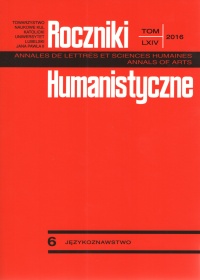Aspectuality and consecutio temporum in Polish and Dutch
Abstract
In Poland, Dutch is becoming gradually a popular foreign language. It belongs to the Germanic languages, which have a verbal system with tenses. Polish is a Slavonic language with an aspectual verb system. In Polish there are 3 grammatical tenses: present tense, future tense and past tense. Polish verbs can be used in a perfective and an imperfective aspect. In Dutch we have 8 tenses. Four of them are voltooid (perfect) describing the situation or action as completed and the other four are onvoltooid (imperfect), they describe the situation or action as continuous or progressive. As all Germanic languages, Dutch lost aspect as an obligatory grammatical category. The perfective and imperfective aspect of the verb depends on other parts of the sentence.
References
Agrell S.: Aspektänderung und Aktionsartbildung beim polnischen Zeitworte. Ein Beitrag zum Studium der indogermanischen Präverbia und ihrer Bedeutungsfunktionen, Diss. Lund 1908.
Algemene Nederlandse Spraakkunst, red. W. Haeseryn, Groningen 1997, wersja elektroniczna: http://www.let.ru.nl/ans/e-ans
Bertinetto P.M., Ebert K.H., Groot C. de: The progressive in Europe, w: Tense and Aspect in the Languages of Europe, red. Ö. Dahl, Berlin–New York 2000, s. 517-558.
Boogaart R.: Aspect and Temporal Ordering, The Hague 1999.
Bogusławski A.: Aspekt i negacja, Warszawa 2003.
Cockiewicz W.: Aspekt na tle systemu słowotwórczego polskiego czasownika i jego funkcyjne odpowiedniki w języku niemieckim, Kraków 1992.
Cockiewicz W.: Na peryferiach aspektu, „LingVaria” 2(2007), nr 2(4), s. 9-23.
Czarnecki T.: Aspektualität im Polnischen und Deutschen. Bedeutungen und Formen in einer konfrontativen Übersicht, Gdańsk 1998.
Czochralski J.: Verbalaspekt und Tempussystem im Deutschen und Polnischen. Eine konfrontative Darstellung, Warszawa 1975.
Filip H.: Aspect, Situation Types and Nominal Reference, Ph.D. dissertation, University of California, Berkeley, CA 1993.
Gramatyka współczesnego języka polskiego. Morfologia, red. R. Grzegorczykowa, R. Laskowski, H. Wróbel, Warszawa 1998.
Grzegorczykowa R.: Funkcje semantyczne i składniowe polskich przysłówków, Wrocław–Warszawa–Kraków 1975.
Grzegorczykowa R.: Nowe spojrzenie na kategorię aspektu w perspektywie semantyki kognitywnej, w: Semantyczna struktura słownictwa i wypowiedzi, red. R. Grzegorczykowa, Z. Zaron, Warszawa 1997, s. 25-38.
Grzegorczykowa R.: Problem kwantyfikacji w grupie werbalnej, w: Liczba. Ilość. Miara. Materiały konferencji naukowej w Jadwisinie 11-13 maja 1972 r., red. Z. Topolińska, M. Grochowski, Wrocław–Warszawa–Kraków 1973, s. 83-89.
Haasse H.: Heren van de thee, Amsterdam 2005.
Haasse H.: Panowie herbaty, przekł. A. Oczko, Warszawa 2010.
Holvoet A.: Aspekt a modalność w języku polskim na tle ogólnosłowiańskim, Wrocław 1989.
Isačenko A.: Die russische Sprache der Gegenwart, Halle (Saale) 1962.
Kaleta Z.: Gramatyka języka polskiego dla cudzoziemców, Kraków 1995.
Karolak S.: Od semantyki do gramatyki, Warszawa 2001.
Kątny A.: Aspektualität in germanischen und slawischen Sprachen, Poznań 2000.
Koschmieder E.: Nauka o aspektach czasownika polskiego w zarysie, Wilno 1934.
Krifka M.: Nominalreferenz und Zeitkonstitution, München 1989.
Laskowski R.: Präpositionele Ausdrücke mit temporaler Funktion im Polnischen, Beiträge zu einer gleichnamigen Tagung Oldenburg, Oldenburg 2003, s. 193-226.
Laskowski R.: Studia z leksykologii i gramatyki języków słowiańskich, Kraków 1996.
Laskowski R.: Temporalne frazy przyimkowe o funkcji prospektywnej i retrospektywnej, w: Przysłówki i przyimki. Studia ze składni i semantyki języka polskiego, red. M. Grochowski, Toruń 2005, s. 209-225.
Młynarczyk A.: Aspectual pairing in Polish, Utrecht 2004.
Młynarczyk A.: Aspectuele overeenkomsten tussen het Pools en het Nederlands, „Nederlandse Taalkunde” 6(2001), s. 272-289.
Nagórko A.: Podręczna gramatyka języka polskiego, Warszawa 2010.
Nederlandse grammatica voor anderstaligen, red. A.M. Fontein, A. Pescher-ter Meer, Utrecht 2004.
Pelc J.: Logika i język, Warszawa 1967.
Perlin J.: Ile jest we współczesnej polszczyźnie czasowników dwuaspektowych, „Linguistica Copernicana” 2010, nr 1(3), s. 165-171.
Piernikarski C.: Typy opozycji aspektowych czasownika polskiego na tle słowiańskim, Wrocław–Warszawa–Kraków 1969.
Smereczniak M.: Morfologiczne i leksykalne wykładniki kategorii czasu w nauczaniu języka polskiego jako obcego, Katowice 2012.
Stawnicka J.: Aspekt – iteratywność – określniki kwantyfikacyjne (na materiale form czasu przeszłego w języku polskim), Katowice 2007.
Stawnicka J.: Studium porównawcze nad kategorią semantyczno-słowotwórczą Aktionsarten w języku rosyjskim i polskim, Katowice 2009.
Śmiech W.: Funkcje aspektów czasownikowych we współczesnym języku ogólnopolskim, Łódź 1971.
Thieroff R.: On the areal distribution of tense-aspect categories in Europe, w: Tense and Aspect in the Languages of Europe, red. Ö. Dahl, Berlin–New York 2000, s. 265-305.
Thieroff R., Ballweg J.: Tense Systems in European Languages, Tübingen 1994.
Verkuyl H.: Non-Durative Closures of Event, w: Studies in Discourse Representation Theory and the Theory of Generalized Quantifiers, red. J.A.G. Groenendijk i in., Dordrecht 1987, s. 87-113.
Verkuyl H.: A Theory of Aspectuality, Cambridge 1993.
Zeggerman J.: Zes sterren, Amsterdam 2002.
Copyright (c) 2016 Roczniki Humanistyczne

This work is licensed under a Creative Commons Attribution-NonCommercial-NoDerivatives 4.0 International License.





